How The pH Of Your Cleaner Affects What It Will Clean
Here is an easy to understand scientific explanation of why the pH of a cleaner affects what it will clean, so you can always choose the best cleaning product for the job.
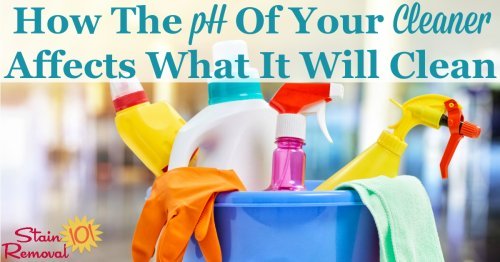
If you're like many other people, you've got a relatively large supply of cleaning products in your home. Perhaps you bought one product because it was on sale, another because of an advertisement you saw, and yet another because your friend recommended it.
When looking at all these supplies though, you may wonder, which product will work best for what type of cleaning job?
On the other hand, if you make your own cleaning products you may have a lot less total cleaning supplies on hand, but you may be wondering why a certain product you've made works like a miracle cleaner for one tough cleaning job, while it's not as effective on something else?
In either event a little bit of science knowledge will help you make a better decision about what type of cleaning product to use on what type of dirt.
So right now I want you to think back to your high school chemistry class and remember the pH scale, and I'll explain below exactly why the pH of a cleaner matters, and why certain types of cleaners, either acidic, alkaline, or neutral, work best in different situations.
Science 101: What Is The pH Scale
Let's start with a bit of Science 101, and review exactly what the pH scale is.
In chemistry a pH scale is used to measure the acidity or basicity of a solution.
All liquids, including cleaning products, have a pH measurement. The pH scale ranges from 0 to 14, with 7 being neutral.
If a solution has a pH lower than 7 it is acidic, with the lowest numbers being the strongest and more corrosive acids.
If a solution has a pH higher than 7 it is basic (also known as alkaline), with the highest numbers being the most basic and caustic.
Pure water is neutral, and has a pH of 7.
Safety Precautions Necessary When Using Cleaners High Or Low On The pH Scale
Whenever you clean something in your home with a cleaning product that is either very high or low on the pH scale you've got to take precautions.
First, be careful that the product you've chosen to clean with doesn't damage the surface of the item you're trying to clean, because stronger cleaners more easily damage some surfaces.
In addition, you should also take personal precautions, such as using gloves, eye protection, and cleaning in a well ventilated area when using these more caustic cleaners.
Alkaline Cleaner Uses
Most cleaning products are alkaline in nature, meaning they have a pH that is higher than 7.
Examples of basic cleaning product ingredients include baking soda, which has a pH of 9, borax, which has a pH of 10, washing soda, which has a pH of 11, and ammonia, which has a pH of 12.
Basic cleaning products include chlorine bleach, oven cleaner, laundry detergent and dishwasher detergent.
The reason that most cleaning products have a basic pH is because alkaline cleaners are very effective for cutting through grease, as well as organic substances like household dirt.
These organic substances, which include proteins, along with oil and fats, are the most common types of cleaning jobs you'll encounter in your home.
That therefore means that many times, when you encounter a tough cleaning job, you should reach for something alkaline to clean with.
Acidic Cleaner Uses
There are far fewer cleaning products which are acidic in nature, meaning that they have a pH lower than 7.
Examples of acidic cleaning product ingredients include vinegar and lemon juice, both of which have a pH of around 3.
Acidic cleaners most commonly include tub and tile cleaners and other bathroom cleaners, at least the ones designed to remove soap scum, as well as rust stain removers.
While alkaline cleaners work best to get rid of organic dirt and soil, acidic cleaners work best to remove inorganic substances.
Examples of inorganic substances you're likely to need to clean up in your home include calcium and other hard water deposits, as well as rust, and substances like soap scum.
pH Neutral Cleaner Uses
When you've got a tough cleaning job it makes sense to reach for something strong to clean it with, either acidic or alkaline, depending on what you're trying to clean.
However, there is definitely a place for using products that are pH neutral, or at least are either just mildly basic or acidic. That's because there are many situations when using something extremely strong isn't warranted, such as if the cleaning job isn't really that tough to begin with, and therefore there is no reason to pull out the "big guns."
After all, the lower or higher the pH, compared to neutral, the more safety precautions you, yourself, need to follow.
Cleaning products can be really tough on your skin, for example, so if a milder product works, why expose yourself to something so harsh?
In addition to keeping yourself safe, neutral cleaners are also important to use in situations where something either acidic or alkaline will damage the surface you're trying to clean.
An example is that you should avoid extremely alkaline cleaners when cleaning aluminum, because it will pit or stain the metal. That's why you're advised not to wash aluminum items in the dishwasher, since dishwasher detergent is alkaline in nature.
Another example is that when cleaning stone, such as marble or granite, it's important to avoid acidic cleaners, since they can damage and etch the stone surface. That's why stone cleaners have a neutral, or near neutral pH.
Examples of pH neutral or close to neutral products include many all purpose cleaners, including most dish soaps, which are often mildly basic.
These products are much less likely to damage surfaces, making them ideal for "all purposes" and are gentler on your hands as well.
These milder products should always be your first choice for most cleaning projects, and then pull out the stronger pH products, either with higher or lower pH levels, depending on what you're trying to clean, only if it is necessary.
I hope this cleaning science 101 lesson explained at least a few pieces of the puzzle about how pH of various cleaners impacts and affects what it will clean in your home, so you can make good decisions about what product you should choose in what situation to make the cleaning task easier and more effective.
If you're looking for some good cleaning products, make sure to check out the site's cleaning supplies reviews here! (There are so many I had to break them up into several pages, but you can start with A through H).
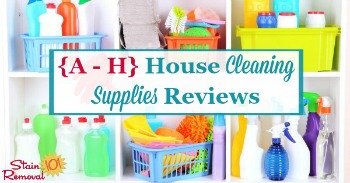
In addition, if you'd like to make your own cleaning products, check out this round up of homemade cleaning products recipes.
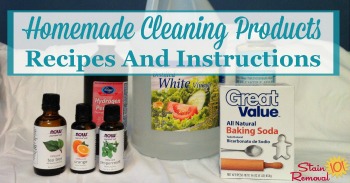
Thanks For Visiting My Website: Grab Your Free Gift!

Hi, I'm Taylor, a busy mom with 3 kids, so I have lots of hands on experience with house cleaning, laundry and my fair share of spots, spills and other messy catastrophes. Thanks for visiting my site.
I update the website all the time with tips, tutorials, cleaning recipes, reviews of products from readers like you, and tests I've done on various cleaners, removers and laundry supplies.
I'd love to give you a gift! When you subscribe to my free weekly newsletter you will receive a free printable laundry stain removal chart that you can reference as needed.
I hope you enjoy this gift, and stop by again soon!
Related Pages You May Enjoy
Household Cleaners Reviews {I - Q}
Why You Should Be Suspicious Of Cleaning Recipes That Contain Both Baking Soda And Vinegar
Go From How The pH Of Your Cleaner Affects What It Will Clean To Home Page
CAUTION: This website is provided for informational purposes only. It is provided as is, without warranties or guarantees. Some stains and messes just won't come out, and are permanent. Further, some cleaning methods can harm your item, so if what you want to clean or launder is sentimental or expensive call a professional. See disclaimer of liability for more information.
Popular Types Of Cleaner Reviews
Let's Stay Connected!
Get Free Email Updates
(and get a FREE printable)
Related Pages
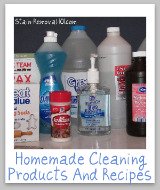 Taylor's Recommended Cleaning Recipes
Taylor's Recommended Cleaning Recipes
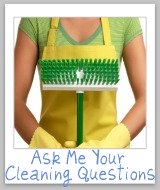 Ask Me Your Cleaning Questions
Ask Me Your Cleaning Questions
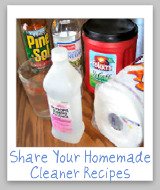 Tell Me How You Make Household Cleaners
Tell Me How You Make Household Cleaners
 Visit Household Management 101
Visit Household Management 101
 Visit Home Storage Solutions 101
Visit Home Storage Solutions 101
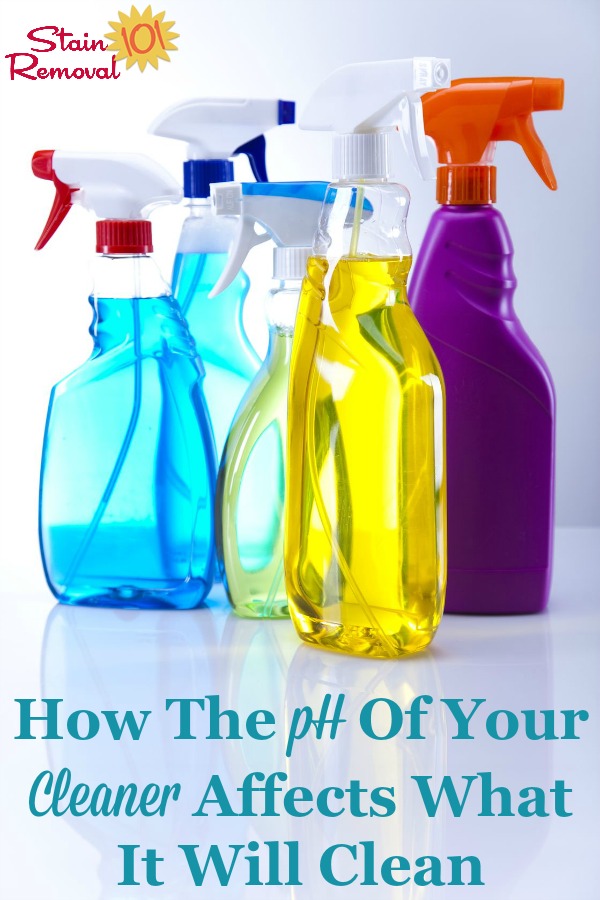
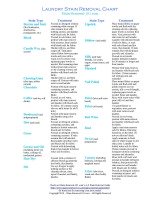
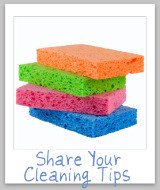
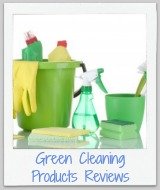
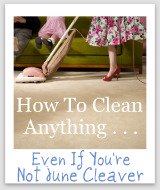
Share Your Comments, Tips & Ideas